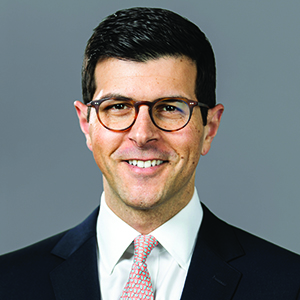 The industry event anyone in secured finance attends now celebrates its 77th year. SFNet is set to make the Arizona convention a memorable one. Click below to register.
The industry event anyone in secured finance attends now celebrates its 77th year. SFNet is set to make the Arizona convention a memorable one. Click below to register.

Jesse T. Kirsch
Of Counsel, Paul Hastings LLP
Jesse T. Kirsch is of counsel in the Global Finance practice of Paul Hastings and is based in the firm’s New York office. He focuses on the representation of leading commercial and investment banks and alternative lenders in large cap and middle-market leveraged finance transactions. His broad-based domestic and international finance experience includes widely syndicated and bilateral credit facilities, acquisition financings, and asset-based facilities. Jesse advises clients throughout the deal cycle, from commitment letters to execution, and from refinancings to restructurings. He practices across a variety of industries, including software and technology, energy, gaming, healthcare, and life sciences, with extensive experience negotiating credit and security documentation.
Jesse earned his J.D. from New York University School of Law and his Bachelor of Science in Business Administration with a concentration in Finance from the University of Florida.
What is the best professional advice you have been given and how have you implemented it?
When presenting an issue, come to the table with a solution. Even if it doesn’t completely solve the problem, you’ve potentially paved the way toward resolution by presenting a viable path forward. Our industry is extremely complex and obstacles consistently arise, threatening successful transactions or engagements. Thinking critically about the underlying issue and being the problem-solver – or starting the conversation with a proposal so others can contribute to that solution – goes a long way to establishing trust and credibility from all parties. While this applies most readily to each person’s area of expertise, solutions-oriented professionals aren’t bound by their title. As a legal advisor in often intense negotiations spanning various industries, markets and geographies, I’m frequently presented with conflicting positions on novel situations, even for a group of highly experienced professionals. Identifying the issue is easy – offering a creative or bespoke solution is a highly valuable contribution to a shared goal and differentiates you from other professionals in your field. In these circumstances, I strive to find that “daylight” between the bid and ask to lead the group forward. Of course, this requires many ancillary qualities – confidence in your grasp of the issue and information, consideration of the various interests and a reasoned approach to negotiation. Use all of the resources at your disposal to be the solution.
What advice do you normally give to the junior talent you mentor?
Dive in head first. Be proactive, take ownership and challenge yourself. Acting as legal counsel to sophisticated teams of finance professionals in transactions involving this many zeros can be rewarding, but there’s a steep learning curve. I recall during my first few months taking copious notes about terms and provisions I never thought I’d grasp. But after a concerted effort to be involved in as many transactions (and processes within those transactions) as possible, things started to come together. Like many others with whom I’ve worked, I operate on a “responsibility when ready” philosophy. A junior lawyer’s proactivity or ownership of part of a transaction benefit both parties. The junior lawyer gets more reps, which leads to a better understanding of the intricacies of 200+ page documents, and I understand I have a dedicated colleague who is striving to contribute their talents to the team.
How do you define a good leader?
Many people can lead a group of people in a common endeavor. However, good leaders understand the needs and capabilities of each member of a team and direct the group in a manner that achieves the desired result, balancing efficiency, effectiveness and individual and team satisfaction. There’s no single characteristic or action that makes a good leader. It requires empathy for those around you, including their personal and professional goals or circumstances, and what they need from you in order to reach their potential. Good leaders also need a willingness to “let go” and empower each team member to make contributions according to his or her abilities. Thoughtfully delegating and, sometimes, re-delegating, is a hallmark quality of a good leader. And, most importantly, a consistent acknowledgment and appreciation for those contributions, regardless how big or small.
What are some negotiation tactics you’ve learned over the years?
Be well-informed, be courteous and be (generally) reasonable. It’s a small world and you’re almost sure to cross paths with a prior counterparty or their acquaintance. Don’t lose your credibility for tomorrow by sacrificing it today.
77th Annual Convention
 The industry event anyone in secured finance attends now celebrates its 77th year. SFNet is set to make the Arizona convention a memorable one. Click below to register.
The industry event anyone in secured finance attends now celebrates its 77th year. SFNet is set to make the Arizona convention a memorable one. Click below to register.
